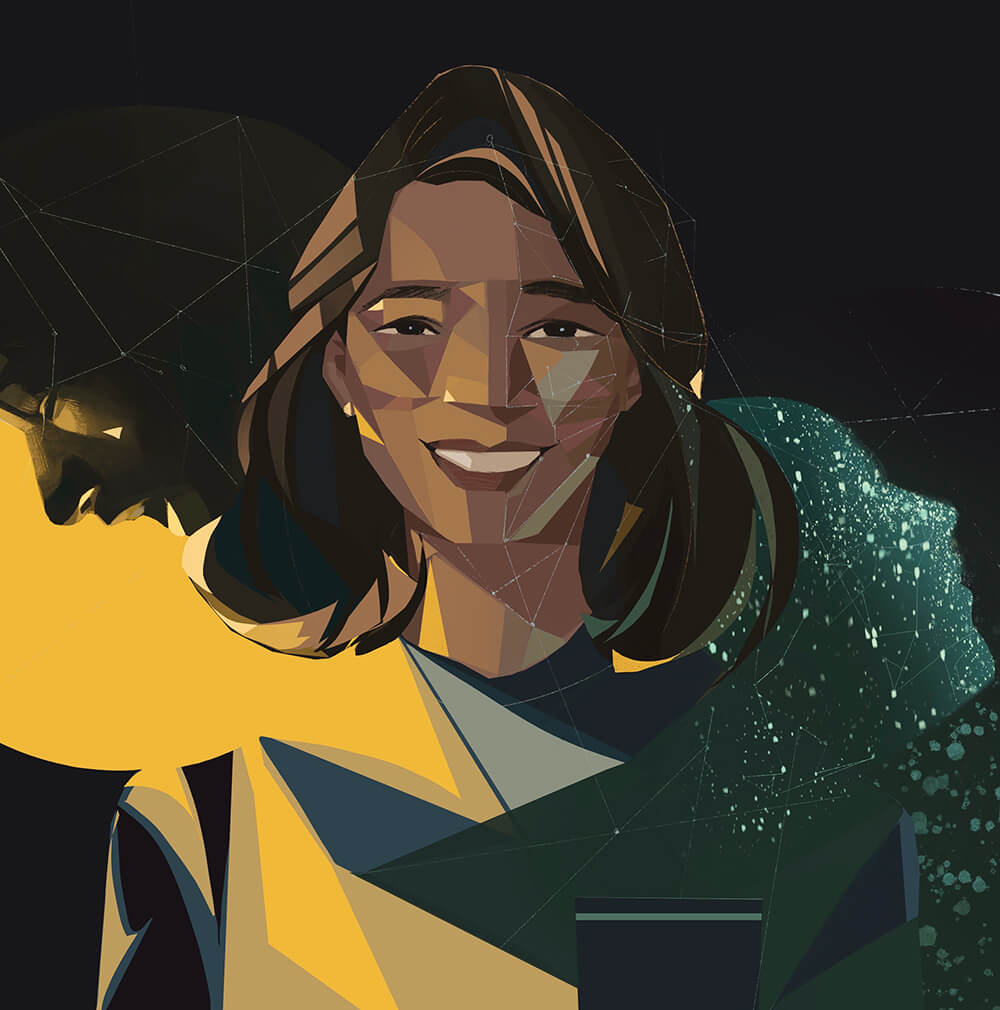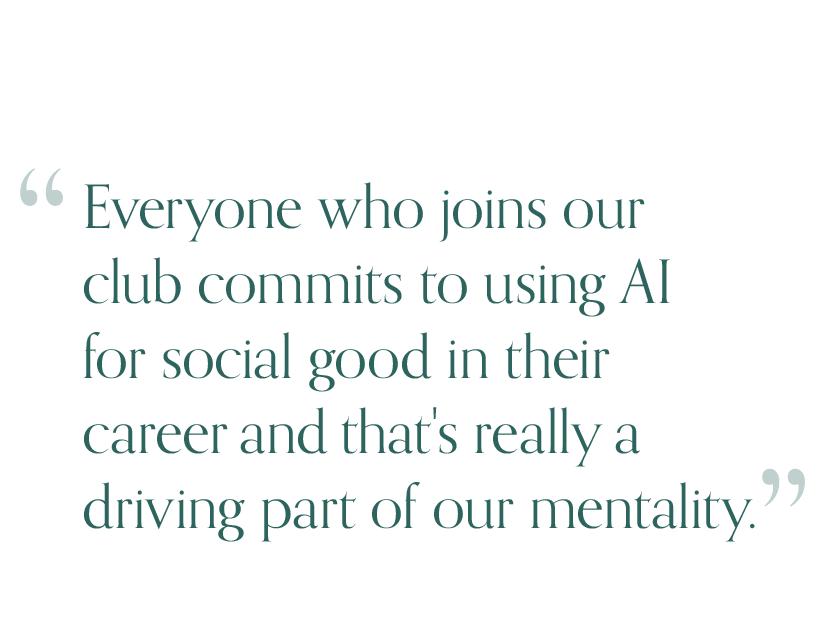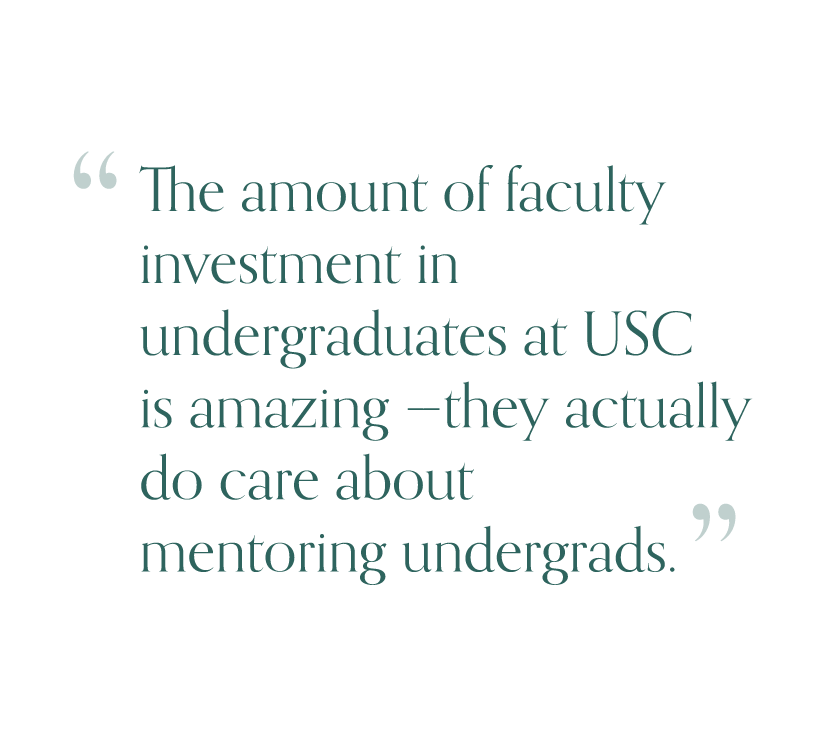RenAIssance Woman

LEENA MATHUR is nothing short of a renaissance woman.
Along with her three majors – computer science, linguistics, and cognitive science – Mathur is the president of CAIS++, the student branch of the USC Center for AI in Society, CAIS, which specializes in AI solutions to combat issues like homelessness, suicide and sustainability. CAIS++ is the only student club in the U.S. that specifically focuses on AI for social good.

CAIS++ has worked on research projects such as detecting deepfakes and manipulated media, predicting drought, creating medical applications to help diagnose diseases, and reducing bias in machine learning algorithms. A project Mathur is currently working on is preserving endangered languages, such as Ladin, spoken in the Italian Alps.
“Everyone who joins our club commits to using AI for social good in their career and that’s really a driving part of our mentality,” Mathur said. “We care about having a real-world impact in all our projects.”
Mathur appreciates that USC allows her the opportunity to pursue multiple academic fields. “I don’t think that I would’ve been able to pursue my three majors across multiple schools and departments as an undergraduate at another university,” she said. “USC and Viterbi not only made this possible, but actively encouraged it.”
Growing up in Silicon Valley, Mathur was interested in technology from an early age. After being adopted from an orphanage in India, Mathur came to the U.S. as a toddler and was raised by a single mother who encouraged her curiosity and diverse interests. Mathur’s mother, who came to the U.S for graduate school after studying electrical engineering at the Indian Institute of Technology, is a tenured business professor at San Jose State University, with two doctorates in different fields, and a career that has spanned engineering, management consulting and academia.
“I’m inspired by my mom,” Mathur said. “While she hasn’t studied any of my majors, she has encouraged me to read widely, explore different fields and not be afraid of defining my own interdisciplinary path in life.”
At USC, that interdisciplinary path has seen Mathur conduct research on socially assistive robots aiding children with autism in USC’s Interaction Lab; develop algorithms for preserving endangered languages in USC’s Linguistics Department; and create models for detecting human behaviors and emotions for her undergraduate thesis.
“Academically, Leena is so advanced that she’s been an equal with the Ph.D. students in my lab, often providing expertise in machine learning that is beyond areas that they had explored,” said Maja Matarić, Chan Soon-Shiong Chair and Distinguished Professor of Computer Science, Neuroscience and Pediatrics. “Every time I talk to Leena, I discover another reason to be impressed.”
Matarić is not alone in this. Last year, Mathur won the Barry Goldwater Scholarship, the top STEM research award for undergraduate students in the U.S., alongside just 22 other computer science students in the country.
“I aspire to become an excellent scientist, so this work ethic is a way of life for me,” Mathur said, noting that she plans on doing her Ph.D. after graduation. She explained that she only pursues projects that are personally fulfilling, so she doesn’t find them stressful. When the weight of classwork and exams can get overwhelming, she takes time to relax by going on a run, drinking tea, spending time with a great network of friends, exploring foods in L.A. or meditating.
 The support of mentors has also been invaluable, she added. She considers Matarić, her research advisor since freshman year, a role model, and acknowledged the guidance and support she’s received from Khalil Iskarous, associate professor of linguistics; Bistra Dilkina, CAIS co-director and associate professor of computer science; and Michael Shindler, a computer science professor now at UC Irvine.
The support of mentors has also been invaluable, she added. She considers Matarić, her research advisor since freshman year, a role model, and acknowledged the guidance and support she’s received from Khalil Iskarous, associate professor of linguistics; Bistra Dilkina, CAIS co-director and associate professor of computer science; and Michael Shindler, a computer science professor now at UC Irvine.
“The amount of faculty investment in undergraduates at USC is amazing — they actually do care about mentoring undergrads,” Mathur said. “They will definitely create opportunities for undergrads who search for them, especially in research. The importance of faculty mentorship cannot be overstated.”
Along with the support of her mentors, Mathur’s unwavering focus on her goals is a huge part of her success. “I really enjoy talking with her, because she’s so grounded in what matters and not easily distracted or confused, impressively so for her young age,” Matarić said. “I wish we could keep her at USC! Well, I wish I could keep her in my lab. Leena is the type of renaissance student that represents all the best about USC.”



